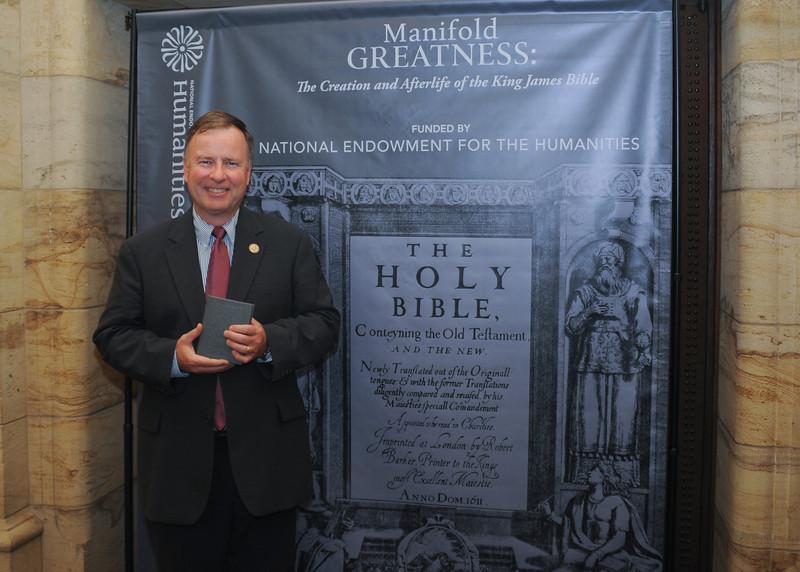A Biblical Event
A new NEH-supported exhibition chronicles 400 years of the King James Bible

Bibles on display at the Manifold Greatness exhibition
Credit: Ruth David/ NEH

Bibles on display at the Manifold Greatness exhibition
Credit: Ruth David/ NEH
The King James Bible, published in 1611, has had unparalleled influence on both the religious and secular worlds. One of the most-read texts in the English language, its words echo in our music, literature, and popular culture. The translation of the Bible authorized by King James I of England is the version on which presidents have taken their oaths of office and is found on the bedside table of hotel rooms.
In commemoration of the 400th anniversary of the publication of the King James Bible, the Folger Shakespeare Library and Oxford University’s Bodleian Library, with assistance from the Harry Ransom Center at the University of Texas at Austin, have brought together 100 rare books and artifacts for a special exhibition Manifold Greatness: The Creation and Afterlife of the King James Bible.
Supported by a major grant from the National Endowment for the Humanities, the Manifold Greatness exhibition tells the surprising story of the King James Bible’s creation and lasting impact: how translating the Bible into English changed from a criminal activity, punishable by death, to a royally-sponsored undertaking; how a team of nearly 50 translators labored over each line and how its publication brought financial ruin to the King’s printer tasked with producing the book; how the King James translation emerged as the English language version of the Bible and a cultural touchstone whose influence has permeated all aspects of culture, art, and society — from Handel to Elvis Presley, from John Milton to Toni Morrison, from Abraham Lincoln to Martin Luther King, Jr.
Visitors to the exhibition can see the first edition of the King James Bible as well as some of its predecessors, including a rare Wycliffite Bible from the 1380s, and a 1602 copy of a Bishops’ Bible annotated with changes by the King James Bible translators. Also on display are a King James Bible that came over on the Mayflower, bibles owned by Frederick Douglass and Elvis Presley, and the so-called “Wicked Bible,” a 1631 edition in which the printer omitted a key word from the commandment about adultery.
Manifold Greatness: The Creation and Afterlife of the King James Bible opened at the Folger Shakespeare Library in Washington, DC, on September 23rd and runs until January 15, 2012 before traveling to the Harry Ransom Center in Austin, Texas. In addition, forty libraries around the country have received NEH grants to host a traveling panel version of the exhibition from 2011-2013 through a partnership between the National Endowment for the Humanities and the American Library Association (ALA). Both exhibitions are accompanied by a richly-illustrated teaching website on the history and impact of the King James Bible (http://www.manifoldgreatness.org/), also made possible by a grant from the National Endowment for the Humanities.
On September 21st the National Endowment for the Humanities invited members of Congress and their staff to preview the exhibition that will travel to their districts. Among the visitors was Representative Doug Lamborn of Colorado, whose district will host the Manifold Greatness traveling exhibition in spring of 2012 at the East Library in Colorado Springs. Also in attendance was Representative Daniel Webster of Florida who himself owns a title page of a 1611 King James Bible, given to him to mark his swearing-in as Speaker of the Florida House of Representatives.
